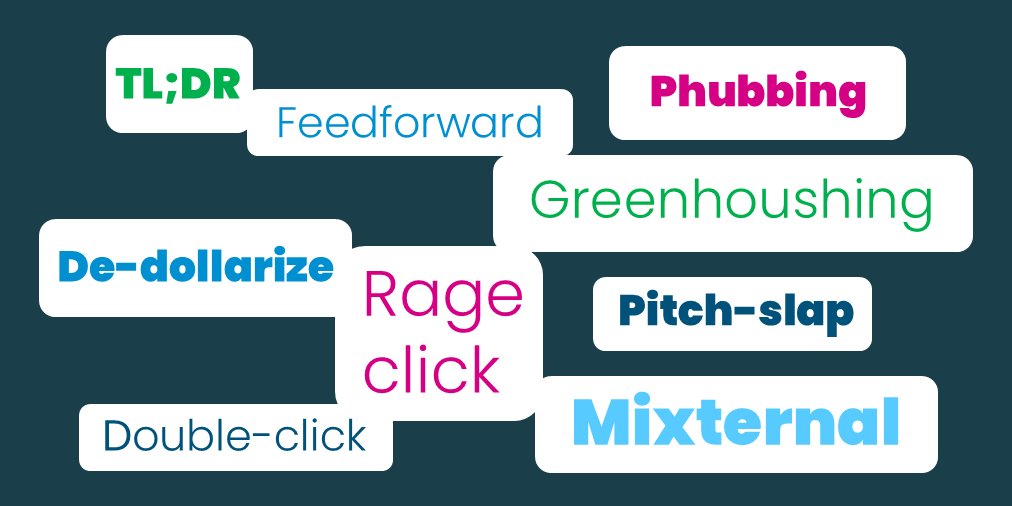
The 9 words we’re seeing a lot of, with mixed emotions
On Monday Merriam-Webster announced the addition of 690 words to its dictionary. Words such as doggo, chef’s kiss and bracketology are not necessarily new this year. Rather, according to the announcement, “these new additions have demonstrated widespread use over time and offer a window into the world today.”
In that same spirit (and applying similarly vague standards of selection), below we present our own motley—some investment-specific, others not—collection of words and terms. This is the year they seem to be popping up in everything we’re reading so we thought we’d dig into them ourselves, including querying ChatGPT, for a quick report.
Curiously, more than once ChatGPT returned this response: “Pinning down the exact first use of the term is challenging without comprehensive textual analysis of every publication throughout history.” Always the eager beaver but, as you’ll read below, the AI brainiac doesn’t always know everything.

Are there other words you’ve been noticing lately? Comment below to add to the list.
- De-dollarize (also spelled dedollarise by Wikipedia and others) — Over the years, several countries have sought to minimize their exposure to fluctuations in the value of the U.S. dollar. But while de-dollarizing has been a recurring theme, the word and concept has enjoyed a resurgence since the Ukraine-Russian conflict.
- Double-click — Broadened to apply to more than how you interact with a computer, the popular phrase means “let’s take a closer look.” It’s the new “deep dive,” if you will. None other than the Financial Times covered this trend in June (see Wall Street has a new favourite phrase and it’s utterly nauseating).
- Feedforward — In the dictionary as “the modification or control of a process using its anticipated results or effects,” feedforward has been appropriated as a preferred alternative to “feedback” when evaluating employees. This places the emphasis on future performance, according to management consultant Marshall Goldsmith years ago—but in a trend firmly entered into the mainstream with this recent New York Post article.
If ChatGPT knows about this use, it’s not saying, limiting its explanation of the term to control systems engineering and neural networks.
- Greenhushing — Treehugger.com is reported to have coined greenhushing as many as 15 years ago, but it gained traction late last year. Fast Company in March called it a “new, negative sustainability trend.” The word refers to companies purposely keeping quiet about their sustainability goals for fear of public backlash or to evade scrutiny. Greenhushing companies seek to avoid being labeled as “greenwashing” or deceptively overstating their commitment to the environment.
- Mixternal — One of the truly new words on the list, mixternal is described on this site as “an integrated strategic approach to engage both internal and external audiences through coordinated efforts in messaging, in content, and in channel strategy.” (The Lowe Group has been doing that for years and didn’t know there was a word for it!)
The pandemic—a time when many employees working from home were tracking what companies were saying publicly about their business and their jobs—illustrated the importance of matching external and internal messages. The same website raises the concept of transitioning from dialogue to “multilogue,” but let’s leave it there.
- Phubbing — The combination of phone and snubbing, phubbing refers to ignoring someone who’s physically present and instead paying attention to one’s own phone. Everyone is familiar with the act of phubbing, but I have my doubts about the future of this word. The word is hard to avoid online, but have you ever heard anyone use phubbing in conversation?
- Pitch-slap — I see mentions of pitch slapping most often on LinkedIn. It typically takes the form of a two-step process—an invitation to connect swiftly followed up with a direct message containing an old-fashioned sales pitch. Those who partake in the practice run the risk of being called out by LinkedIn users who are not above sharing screenshots of the message to stimulate engagement with their own posts.
ChatGPT may need to catch up on this term, too. Chat explains that the term is associated with the 2012 Pitch Perfect movie. “It is a portmanteau of ‘pitch’ (referring to musical pitch) and ‘slapped,’ used to describe a scenario where one group outperforms or surprises another with their musical arrangement and performance.”
Pitch slapping, Chat thereby concludes, is “intended to be a humorous and playful way to describe such a situation, combining elements of music terminology with informal, colloquial language.” Nope, based on some LinkedIn posts, it can be quite triggering.
- Rage click — Is rage on its way to becoming a prefix? Merriam-Webster’s list of new words includes rage quit, which may be the most common word appended by rage. Just the other day the Wall Street Journal used the term rage poke.
The inclusion of rage click on our list is my attempt to get ahead of things. Noting the rise of both rage quit and double-click, it may be just a matter of time before rage click—the act of repeatedly clicking on a button or link on a website or app—is broadened to describe people who repeatedly press elevator buttons.
- TL;DR — Credit Reddit and online communities for originating the use of the abbreviation for Too Long; Didn’t Read. It’s been out there for a while, but lately there’s been no getting away from it, including on quarterly earnings calls.
Not a fan of this one. Pretty sure (and Grammarly confirms) that every non-Welsh word needs to have a vowel. But also TL;DR seems unnecessarily hostile to those whose job it is to thoroughly explain something. I prefer “executive summary,” which doesn’t hurt anyone’s feelings.
Your turn—comment below or send us an email as we expect to be revisiting this topic.
Subscribe.
Receive the latest news and insights from Lowe Group.